Catch22 第二十二条军规
- 格式:pptx
- 大小:416.30 KB
- 文档页数:20
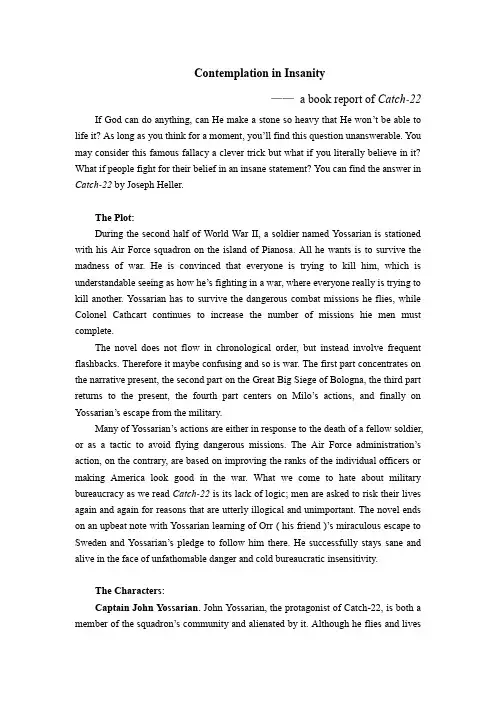
Contemplation in Insanity——a book report of Catch-22 If God can do anything, can He make a stone so heavy that He won’t be able to life it? As long as you think for a moment, you’ll find this question unanswerable. You may consider this famous fallacy a clever trick but what if you literally believe in it? What if people fight for their belief in an insane statement? You can find the answer in Catch-22 by Joseph Heller.The Plot:During the second half of World War II, a soldier named Yossarian is stationed with his Air Force squadron on the island of Pianosa. All he wants is to survive the madness of war. He is convinced that everyone is trying to kill him, which is understandable seeing as how he’s fighting in a war, where everyone really is trying to kill another. Yossarian has to survive the dangerous combat missions he flies, while Colonel Cathcart continues to increase the number of missions hie men must complete.The novel does not flow in chronological order, but instead involve frequent flashbacks. Therefore it maybe confusing and so is war. The first part concentrates on the narrative present, the second part on the Great Big Siege of Bologna, the third part returns to the present, the fourth part centers on Milo’s actions, and finally on Yossarian’s escape from the military.Many of Yossarian’s actions are either in response to the death of a fellow soldier, or as a tactic to avoid flying dangerous missions. The Air Force administration’s action, on the contrary, are based on improving the ranks of the individual officers or making America look good in the war. What we come to hate about military bureaucracy as we read Catch-22 is its lack of logic; men are asked to risk their lives again and again for reasons that are utterly illogical and unimportant. The novel ends on an upbeat note with Yossarian learning of Orr ( his friend )’s miraculous escape to Sweden and Yossarian’s pledge to follow him there. He successfully stays sane and alive in the face of unfathomable danger and cold bureaucratic insensitivity.The Characters:Captain John Yossarian. John Yossarian, the protagonist of Catch-22, is both a member of the squadron’s community and alienated by it. Although he flies and liveswith the men, he is marked as an outsider by the fact that many of the men think he is insane. But Yossarian’s characteristics are not those of a typical hero. He does not risk his life to save others; in fact, his primary goal throughout the novel is to avoid risking his life whenever possible. Maybe it is because that the system of values around Yossarian is so skewed that this approach seems to be the only truly moral stance he can take, if only because it is so logical. In a world where life itself is so undervalued and so casually lost, it is possible to redefine heroism as simple self-preservation. In the end, when offered a choice between his own safety and the safety of the entire squadron, Yossarian is unable to choose himself over others. This concern for others complicates the simple logic of self-preservation, and creates its own Catch-22: life is not worth living without a moral concern for the well-being of others, but a moral concern for the well-being of others endangers one’s life.Milo Minderbinder.Representing an extreme version of capitalist free enterprise that has spiraled out of control, Milo seems simultaneously brilliant and insane. What starts out as a business in black-market eggs turns into a worldwide enterprise in which, he claims, “everyone has a share.” He lies, cheats and steals his way through the war. The Germans pay him to bomb his own base and the Americans pay him to bomb Germans. He uses military planes to fly his goods from place to place, and lives in palaces. Milo tells the men in his squadron that they all have a share of his profits, but he bombs his own squadron as part of a deal he has made with the Germans. His willingness to allow his own camp to be bombed shows his complete disregard for the sides drawn by the war, and the men’ s acceptance of payment for being bombed shows that Milo is not alone in placing a high value on making money.The Themes and Ideas:Catch-22.There’s only one catch to Yossarian’s plan to save himself, and that’s Catch-22. This passage from Chapter 5 marks the novel’s first mention of the paradoxical law called “Catch-22.”There was only one catch and that was Catch-22, which specified that a concern for one’s own safety in the face of dangers that were real and immediate was the process of a rational mind. Orr was crazy and could be grounded. All he had to do was ask; and as soon as he did, he would no longer be crazy and would have to fly more missions. Orr would be crazy to fly more missions and sane if he didn’t, but if he wassane he would have to fly them. If he flew them he was crazy and didn’t have to; but if he didn't want to he was sane and had to. Yossarian was moved very deeply by the absolute simplicity of this clause of Catch-22 and let out a respectful whistle.“That’s some catch, that Catch-22,” he observed.“It’s the best there is,” Doc Daneeka agreed.The more Yossarian learns about Catch-22, though, the bigger it grows, each new clause as infuriating and paradoxical as the last. Catch-22, we learn, is the Bible of bureaucracy — every pointless and petty regulation made by someone who has never seen a battlefield to make themselves look good with no sleep lost for the people like Yossarian who get killed in the process.There’s no reasoning or arguing with Catch-22. It’s not personal. It’s just the rules, and if the rules say that Yossarian has to die, then that’s what Yossarian has to do.Over the course of the novel, Catch-22 is described in a number of different ways that can be applied to a number of different aspects of wartime life; here, however, Catch-22 affects Yossarian most specifically. Catch-22 is alarmingly persuasive; even Yossarian accepts what seems to be its logical infallibility. But Catch-22 is an abstract thing; we find out later that Yossarian believes that Catch-22 does not really exist. It is a trap made up of words, and words are faulty things, often misrepresenting reality. What is so upsetting about the way Catch-22 is applied throughout the novel is that real men are sent into real peril based on a few unreal and unreliable words. The the pointlessness of the fact makes Yossarian crazy.Personality in the insane world.Unlike other anti-romantic war novels, Catch-22relies heavily on humor to convey the insanity of war, presenting the horrible meaninglessness of armed conflict through a kind of desperate absurdity rather than through graphic depictions of suffering and violence. Catch-22also distinguishes itself from other anti-romantic war novels through its core values: the story of Yossarian, the protagonist, is ultimately not one of despair but one of hope. He believes that the positive urge to live and to be free can redeem the individual from the dehumanizing machinery of war. The novel is told as a series of loosely related, tangential stories in no particular chronological order. The narrative that emerges from this structural tangle upholds the value of the individual in the face of the impersonal, collective military mass; at every stage it mocks insincerity and hypocrisy, even when such values appear triumphant.Despite its World War II setting, Catch-22is often thought of as a signaturenovel of the 1960s and 1970s. It was during those decades that American youth truly began to question authority. Hippies, university protests, and the civil rights movement all marked the 1960s as a decade of revolution, and Heller’s novel fit in perfectly with the spirit of the times. In fact, Heller once said, “I wasn’t interested in the war in Catch-22. I was interested in the personal relationships in bureaucratic authority.” Whether Heller was using the war to comment on authority or using bureaucracy as a statement about the war, it is clear that Catch-22 is more than just a war novel. It is also a novel about the moral choices that every person must make when faced with a system of authority whose rules are both immoral and illogical. This reminds me the dark ten years of the Great Proletarian Cultural Revolution. Millions of people were persecuted and suffered a wide range of abuses and millions of people became insane illogical, which makes the perseverance of personal principles more valuable and remarkable.Reference:[1]约瑟夫·海勒.第二十二条军规[M].南京: 译林出版社.[2]常文革.黑色幽默的典范[N].长春师范学院学报,2005-9。
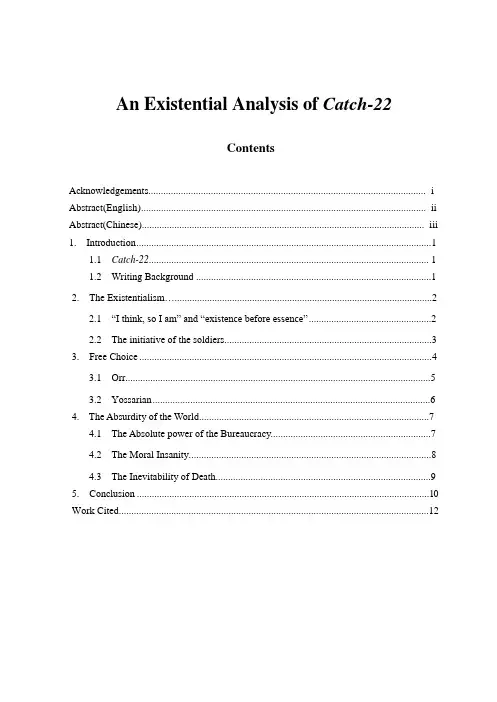
An Existential Analysis of Catch-22ContentsAcknowledgements (i)Abstract(English) (ii)Abstract(Chinese) (iii)1. Introduction (1)1.1 Catch-22 (1)1.2 Writing Background (1)2. The Existentialism (2)2.1 “I think, so I a m” and “e x istence before essence” (2)2.2 The initiative of the soldiers (3)3. Free Choice (4)3.1 Orr (5)3.2 Yossarian (6)4. The Absurdity of the World (7)4.1 The Absolute power of the Bureaucracy (7)4.2 The Moral Insanity (8)4.3 The Inevitability of Death (9)5. Conclusion (10)Work Cited (12)AbstractThis paper is going to talk about the existentialism in Joseph Heller’s masterpiece Catch-22. As regards to the influence of existentialism on literature, Jean Paul Sartre’s theories are the one of the great significance, which is the main concern in this thesis.Joseph Heller (1923-1999) is one of the most representative writers of Black Humor, which forecasts the dominating of American post-modernism literature. The heart of Black Humor is the description of the absurdity of the world, which is also a doctrine of existentialism. So it is said that existentialism is one of the origins of Black Humor.In Catch-22, there are bounds of freedom and the struggles to get off from them, which is a main theme of the book. And as regard to Sartre’s existentialism, the central thought is the freedom to choose what one wants to be or to do, which agrees with the theme of Catch-22 above I have mentioned. So in this paper I just choose Sartre’s existentialist thoughts to analyze it, despite other existentialists. Existentialism is a different point of view to look at the traditional war-novel, from which I think a deeper and more theoretical criticism of the war as well as that of the world can be obtained.For the value of this paper, first of all, it will prove Catch-22 an existential novel. Both centered on the theme of freedom, this novel and existentialism share the same basis, so it’s natural to connect them together. Also, there is chapter four on absurdity to illustrate this point. Thirdly, I want to stress the subjectivity and advantages of existentialism. Although many people think it as superficial and spiritual, it stresses on humanism, paying attention to initiative and subjectivity, which are still hot centers of discussion till now.Key words: Catch-22;Existentialism; Free choice; Absurdity内容摘要约瑟夫·海勒的代表作《二十二条军规》中渗透着存在主义的思想,这也是本论文讨论的主旨所在。
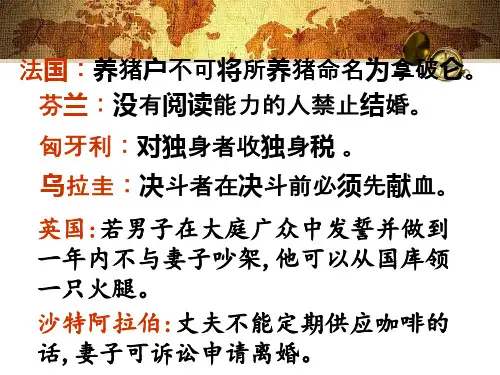

An Existential Analysis of Catch-22ContentsAcknowledgements (i)Abstract(English) (ii)Abstract(Chinese) (iii)1. Introduction (1)1.1 Catch-22 (1)1.2 Writing Background (1)2. The Existentialism (2)2.1 “I think, so I a m” and “e x istence before essence” (2)2.2 The initiative of the soldiers (3)3. Free Choice (4)3.1 Orr (5)3.2 Yossarian (6)4. The Absurdity of the World (7)4.1 The Absolute power of the Bureaucracy (7)4.2 The Moral Insanity (8)4.3 The Inevitability of Death (9)5. Conclusion (10)Work Cited (12)AbstractThis paper is going to talk about the existentialism in Joseph Heller’s masterpiece Catch-22. As regards to the influence of existentialism on literature, Jean Paul Sartre’s theories are the one of the great significance, which is the main concern in this thesis.Joseph Heller (1923-1999) is one of the most representative writers of Black Humor, which forecasts the dominating of American post-modernism literature. The heart of Black Humor is the description of the absurdity of the world, which is also a doctrine of existentialism. So it is said that existentialism is one of the origins of Black Humor.In Catch-22, there are bounds of freedom and the struggles to get off from them, which is a main theme of the book. And as regard to Sartre’s existentialism, the central thought is the freedom to choose what one wants to be or to do, which agrees with the theme of Catch-22 above I have mentioned. So in this paper I just choose Sartre’s existentialist thoughts to analyze it, despite other existentialists. Existentialism is a different point of view to look at the traditional war-novel, from which I think a deeper and more theoretical criticism of the war as well as that of the world can be obtained.For the value of this paper, first of all, it will prove Catch-22 an existential novel. Both centered on the theme of freedom, this novel and existentialism share the same basis, so it’s natural to connect them together. Also, there is chapter four on absurdity to illustrate this point. Thirdly, I want to stress the subjectivity and advantages of existentialism. Although many people think it as superficial and spiritual, it stresses on humanism, paying attention to initiative and subjectivity, which are still hot centers of discussion till now.Key words: Catch-22;Existentialism; Free choice; Absurdity内容摘要约瑟夫·海勒的代表作《二十二条军规》中渗透着存在主义的思想,这也是本论文讨论的主旨所在。

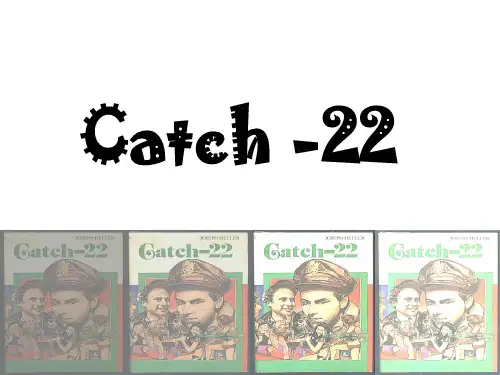

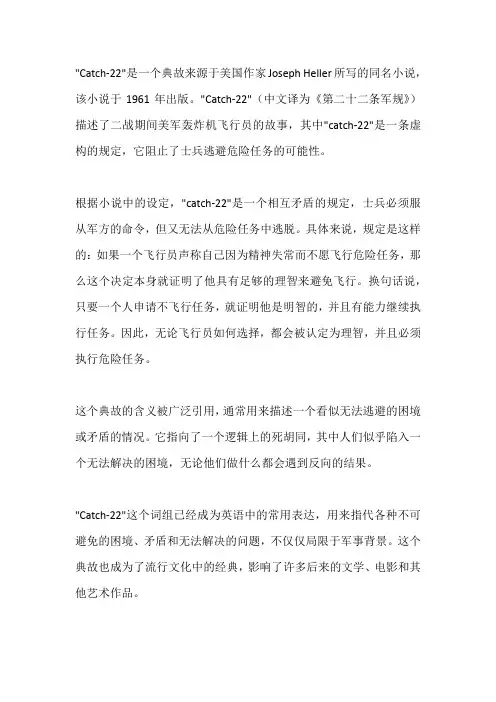
"Catch-22"是一个典故来源于美国作家Joseph Heller所写的同名小说,该小说于1961年出版。
"Catch-22"(中文译为《第二十二条军规》)描述了二战期间美军轰炸机飞行员的故事,其中"catch-22"是一条虚构的规定,它阻止了士兵逃避危险任务的可能性。
根据小说中的设定,"catch-22"是一个相互矛盾的规定,士兵必须服从军方的命令,但又无法从危险任务中逃脱。
具体来说,规定是这样的:如果一个飞行员声称自己因为精神失常而不愿飞行危险任务,那么这个决定本身就证明了他具有足够的理智来避免飞行。
换句话说,只要一个人申请不飞行任务,就证明他是明智的,并且有能力继续执行任务。
因此,无论飞行员如何选择,都会被认定为理智,并且必须执行危险任务。
这个典故的含义被广泛引用,通常用来描述一个看似无法逃避的困境或矛盾的情况。
它指向了一个逻辑上的死胡同,其中人们似乎陷入一个无法解决的困境,无论他们做什么都会遇到反向的结果。
"Catch-22"这个词组已经成为英语中的常用表达,用来指代各种不可避免的困境、矛盾和无法解决的问题,不仅仅局限于军事背景。
这个典故也成为了流行文化中的经典,影响了许多后来的文学、电影和其他艺术作品。
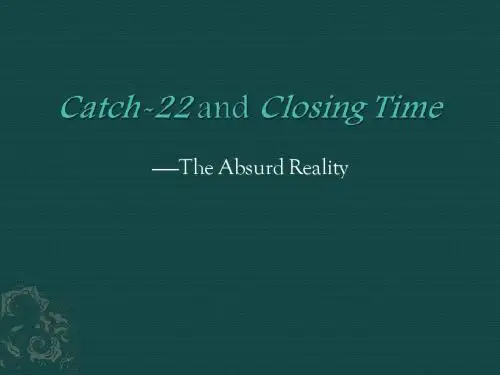
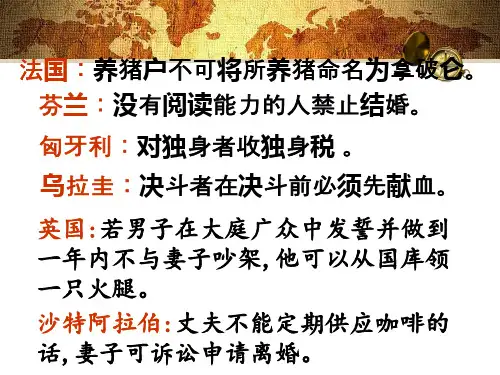
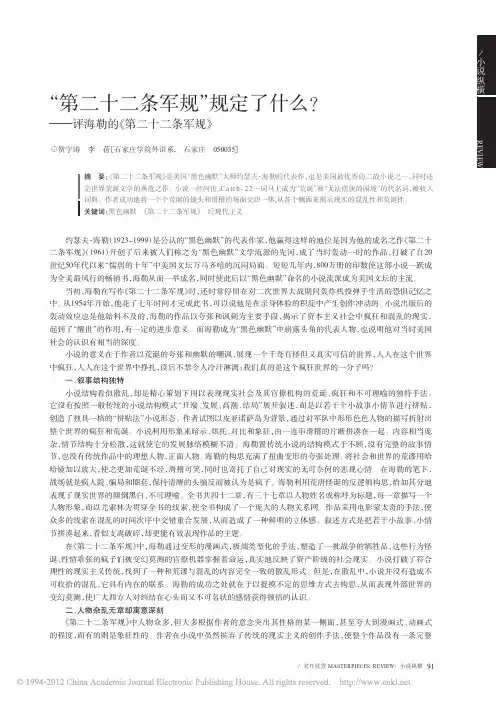
Catch-22的含义内容:第二十二条军规规定,面临真正的、迫在眉睫的危险时,对自身安全表示关注,乃是头脑理性活动的结果。
奥尔疯了,可以允许他停止飞行。
只要他提出申请就行。
可是他一提出请求,他就不再是个疯子,就得再去执行飞行任务。
倘若奥尔再去执行任务,那么他准是疯了,如果他不再去,那他就没有疯。
可是既然他没有疯了,不必再去飞行,可是如果他不想再去,那么他就没有疯,他就非去不可。
连约塞连都不由得感叹第二十二条军规订得真是简单明了,所以深深受到感动,肃然起敬地吹起了一声口哨。
由此可见,第二十二条军规就是一个无法逃脱的圈套。
在这个圈套中,飞行员将被迫进行无限次的飞行任务,除非战争结束,否则永远不能活着回家。
含义:1.第二十二条军规是军队官僚体制用来钳制小人物的圈套;以德里德尔将军、佩克姆将军、卡思卡上校、科恩上校为代表的统治者掌握了绝对的话语权和控制权,而以约塞连为代表的普通小人物只能听其摆布。
以至于卡斯卡上校为了升官至军士生死于不顾,反复增加飞行次数。
小人物都沦为没有灵魂的废物,在恐惧、荒诞的生活中逐渐走向死亡。
克莱文杰是那么严肃,热心而又诚悬,仅因在列队中终了一跤,被谢司科普夫送上军事法庭,最后在一次例行飞行中丧生于一片白云中。
亨格利·乔那样地盼望回国,但飞行任务一次又一次地增加,他再也忍受不了这种紧张的等待心情,在恶梦中死去。
邓巴为了延长生命,故意摔成脑震荡,躲在医院里,结果还是被卡思卡特上校弄得“失踪”了。
麦克沃特对战争毫不在乎,认为自己就是没有脑子,经常低空飞行,将萨普森切为两半,自己也撞山自杀。
奈特雷自愿去替别人执行任务,结果与多布斯的飞机相撞,两人都粉身碎骨。
更令人啼笑皆非的是梅杰少校变成一个有形无神的隐居者,从窗户跳进跳出的怪物。
丹尼卡医生活生生地听别人对他说:“你已经死了,大夫。
”2.象征一种超自然的、能操纵人类命运的神秘力量;第二十二条军规在战争的环境中作为军队官僚体制而存在,但在万千世界中,处处都渗透着二十二条军规的影子,即神秘的、操纵一切的魔力。
“黑色幽默”的经典——《第二十二条军规》《第二十二条军规》在“黑色幽默”派文学中占有突出的地位,是这一流派的代表作。
在人物特征、表现内容、结构情节、语言特征等方面《第二十二条军规》均呈现出独特的写作技巧及构思。
“第二十二条军规”这个词汇作为“难以逾越的障碍”或“无法摆脱的困境”的代名词而被人广泛地运用。
标签:黑色幽默;第二十二条军规;艺术技巧“黑色幽默”是20世纪60年代美国兴起的小说流派,在第二次世界大战以后的西方文坛上占有重要的地位。
“黑色幽默”带有绝望、痛苦、恐怖之意,故又称为“绞刑架下的幽默”,“绝望的幽默”等。
其小说主题荒诞悖谬,情节支离破碎,人物扭曲变形,风格则在滑稽幽默的背后蕴藏着深沉的悲哀与绝望,显示出别具一格的特色。
约瑟夫·海勒的《第二十二条军规》正是其中的典范之作,出版后成为轰动欧美文坛的畅销书,被西方评论界誉为20世纪60年代最好的一部小说,同时成为当代美国文学的经典作品之一。
小说以主人公尤索林的令人啼笑皆非的经历,揭示了“第二十二条军规”的奥秘。
尤索林最初怀着满腔爱国热情入伍,到头来发现战争不过是个骗局,上司们只顾发财,无耻之徒在大战中如鱼得水,越是卑鄙的家伙就越能名利双收。
士兵们的牺牲毫无价值,更没有丝毫的崇高感。
于是他变成一个厌战者和怕死鬼,千方百计想脱离战争。
尤索林指望回国,“第二十二条军规”规定凡是完成飞行次数就可以回国,但同时又规定无论何时都得服从司令官的命令,而司令官就会在你完成的次数上再提出指标。
根据第二十二条军规,凡是疯子就可以停止飞行,这对一心想停止飞行而又人人皆以为疯的尤索林来说可是一个绝好的理由,丹尼卡医生的一席话却令他美梦全消,原来军规在作上述规定的同时,又规定一切精神失常的人员要停止飞行,必须由本人提出申请,而一个人在面临危险时对自身安全表示关注,就证明他不是疯子,于是就产生了如下逻辑:如果你疯了,就可以允许停止飞行,只要你提出申请。
可是你一旦提出申请,就证明你不是疯子。
《第二十二条军规》
《第二十二条军规》是美国海军上将威廉·麦克雷文少校于1944年所著的一本海军军规手册,该手册被认为是美国海军中的经典之作。
全书共分为22条军规,涵盖了军人应具备的品质、纪律和职责。
下面是《第二十二条军规》的中文翻译,全文约2000字。
第一条:纪律
第二条:责任心
第三条:正直诚实
第四条:尊重他人
第五条:合作精神
第六条:持续学习
第七条:勇气
第八条:适应能力
第九条:忍耐力
第十条:执行力
第十二条:创新精神
第十四条:忠诚
第十五条:谦逊
第十六条:体力和精神素质
第十七条:实事求是
第十九条:激情和投入
第二十二条:永不放弃
这些军规是指导海军军人行为的重要准则,也是塑造海军军人精神风貌的重要基础。
只有遵守并践行这些军规,海军军人才能具备良好的素质和能力,成为一支强大的战斗力量。
书评:第二十二条军规记得BBC的《Hotel Babylon》中出现过这样一个镜头,有过一个看起来很一般的老人对 Hotel Babylon的工作人员说,他每年都要去一次伦敦最好的酒店,挑一个酒店最好的位置,点一杯自己最爱的饮料,然后翻开Catch-22用一天时间仔细读一遍,享受这本小说所带给他的快乐、悲伤、喜悦、不安、难过抑或痛苦、绝望,都能通过这本小说来尽情释放,享受这跌宕起伏如坐过山车般的情感变化。
于是那时,就对Catch-22,也就是本篇书评的主角《第二十二条军规》起了浓厚的兴趣。
小说的作者约瑟夫·海勒也对此说过这样一句话:“我要让人先开怀大笑,然后回过头去带着恐惧回顾他们笑过的一切。
”很明显,这是出现于六十年代的黑色幽默的写作手法,是当代美国文学中最重要的文学流派之一。
这一流派的作家突出描写人物周围世界的荒谬和社会对个人的压迫。
《第二十二条军规》也没有脱离这一特点,小说里记录了所有看起来绝不可能发生却又似乎完全真实的军营中的故事:负责采买的军官大发横财,居然可以在全世界各个城市各个宗教组织里都担任重要角色,甚至承包了德军和美军作战任务,并因为对两方情况的绝对掌握获得战功......一再要求下属提高飞行次数的长官自己只飞过两次,其中一次还是因为负责采买的时候被导航员指错了方向才飞到敌方阵营......小说从头到尾充盈着这些荒谬而又可笑的情节,而从小说的后半段开始,男主人公身边的朋友一个一个因战争而送命,让人好笑的情节中穿插进了深深地悲伤和绝望,读者将目睹一个个悲伤的场面接踵而至,感受到主人公的无助与渺小,接着又在某个滑稽荒谬的片段破涕而笑。
于是就会在这样一个情绪如过山车般起伏的过程中逐渐意识到,所有的这些矛盾和荒谬,不是因为主人公的特别,也不是因为他的战友们的怪异,而是因为战争和人性本身。
合上书,平复了心情,再回想一下那著名的“第二十二条军规”理论——根据第二十二条军规,只有疯子才能获准免于飞行,但必须由本人提出申请,但你一旦提出申请,恰好证明了你是一个正常人,还是在劫难逃。